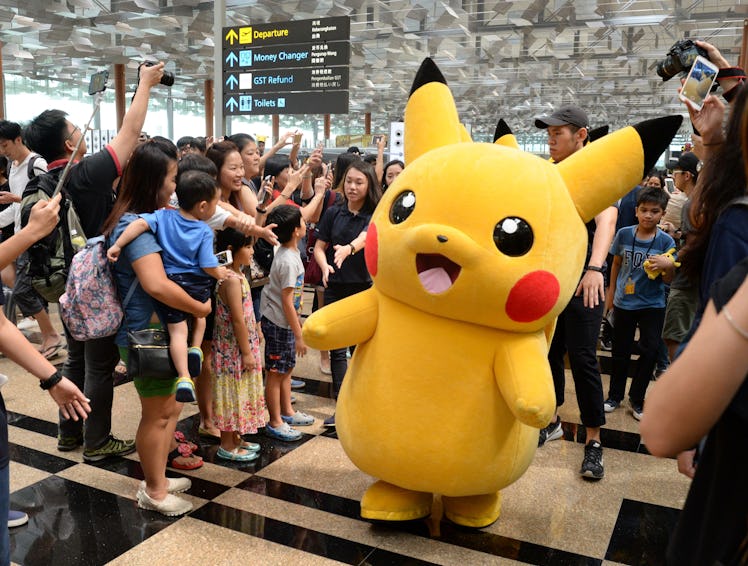
Not Even Pikachu Was Safe: Russian Election Meddling Reportedly Used Pokemon Go
Last summer, as the froth-mouthed political conversation was reaching fever pitch, there was one last safe space. A space — an arena, if you will — in which we could just relax, walk around, and catch pocket monsters. But apparently, not even the augmented reality game of every millennial's dream was safe. According to CNN, Russian election meddling used Pokémon Go to try to influence the 2016 campaign.
Pokémon-freaking-Go.
CNN's Dylan Byers and Donie O'Sullivan reported on Oct. 12 that Russian meddling in the U.S. presidential campaign — which was confirmed as early as Dec. 2016 — extended well beyond targeted ads and troll accounts on Facebook and Twitter, into other social media websites like Tumblr, YouTube, and, yes, Pokémon Go. (This aspect of Russian election meddling should not be confused with special counsel Robert Mueller's investigation into possible collusion between the Trump campaign and Russia.)
As part of a concerted effort to spread false information and sow discord among the American public, Kremlin-linked troll farms created campaigns like the "Don't Shoot Us" campaign CNN found to be operating on Pokémon Go (among other social media sites).
CNN reported,
One Russian-linked campaign posing as part of the Black Lives Matter movement used Facebook, Instagram, Twitter, YouTube, Tumblr and Pokémon Go and even contacted some reporters in an effort to exploit racial tensions and sow discord among Americans, CNN has learned.
Included in the "Don't Shoot Us" Pokémon Go campaign was a contest which told participants to find and train Pokémon "near locations where alleged incidents of police brutality had taken place."
Users were also told to name their Pokémon after victims of alleged police brutality, and winners would reportedly receive Amazon gift cards.
CNN reports that the end-goal of this contest was not exactly clear, beyond the general goal of creating a highly divisive political atmosphere.
It's a frankly bonkers turn of events in an already bizarre (and troubling) story.
As early as July 2016, after the DNC hacks, there were murmurs about Russian attempts to meddle in the U.S. presidential election, per the Washington Post.
But it wasn't until Dec. 2016 that the U.S. government confirmed "with high confidence" that Russia had meddled in the U.S. presidential election with a sophisticated, wide-reaching campaign favoring now-President Donald Trump, according to The New York Times.
That revelation has led to a complicated, drawn-out Congressional investigation by both the the House and Senate Intelligence Committees, which is still on-going.
As part of the investigation, Facebook — which has been the center of controversy about fake news's role in the election — discovered at least 3,000 "politically divisive" ads linked to fake accounts and believed to have been purchased by Russians operatives, according to The Guardian. The large role Facebook played in Russian meddling has even compelled senior Facebook executive Sheryl Sanderberg to apologize: "It’s not just that we apologize. We’re angry, we’re upset. But what we really owe the American people is determination," she said, to prevent it from happening again.
North Carolina Senator Richard Burr, chairman of the Senate Intelligence Committee, even confirmed on Oct. 4 that there is on-going meddling, per The New York Times, and Americans should expect Russian bots and trolls to continue to attempt to sow division in the U.S. as the 2018 mid-term elections loom. The Washington Post confirmed as much when they reported that Russian trolls are trying to drum up more controversy around the "Take A Knee" NFL protests against police brutality by tweeting pro- and anti-protest hashtags.
And while Facebook was a cesspool of keyboard warriors long before Russia reportedly bought ads targeted at residents of Ferguson, Missouri and Baltimore, Maryland, it's perhaps not surprising, given the amount of fake news that proliferated in the lead-up to the election, that outside forces had a role in promoting websites like donotshoot.us, which sounds totally, 100 percent real. After all, Facebook was long ago lost to minion memes and aunts wishing everyone "Merry CHRISTMAS, NOT 'HAPPY HOLIDAYS'!"
But the fact that they went after Pokémon Go?
They have crossed the line.